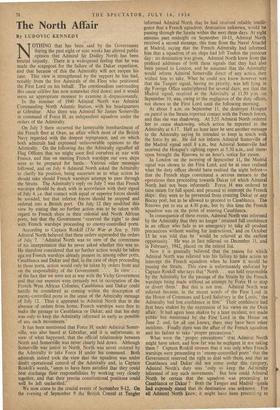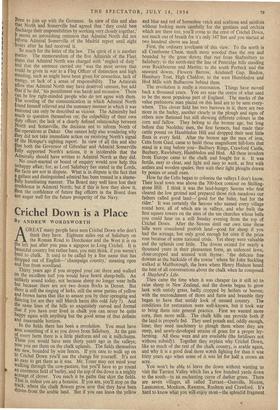By LUDOVIC KENNEDY N OTHING that has been said by the
Government during the past eight or nine weeks has altered public opinion that Admiral Sir Midley North has been treated unjustly. There is a widespread feeling that he was made the scapegoat for the failure of the Dakar expedition, and that because of this the Admiralty will not reopen his case. This view is strengthened by the support he has had, notably from the five Admirals of the Fleet who petitioned the First Lord on his behalf. The emotionalism surrounding this cause celebre has now somewhat died down; and it would seem, an appropriate moment to examine it dispassionately. In the summer of 1940 Admiral North was Admiral Commanding North Atlantic Station, with his headquarters at Gibraltar. Also there was Admiral Sir James Somerville in command of Force H, an independent squadron under the orders of the Admiralty.
On July 3 there occurred the lamentable bombardment of the French fleet at Oran, an affair which most of the British Navy regarded with the deepest repugnance, and on which both admirals had expressed unfavourable opinions to the Admiralty. On the following day the Admiralty signalled all Flag Officers that we might soon find ourselves at war with France, and that on meeting French warships our own ships were to be prepared for battle. Various other messages followed, and on July 6 Admiral North asked the Admiralty to clarify his position, being uncertain as to what action he should take should French warships attempt to pass through the Straits. The Admiralty's reply on July 7 was that French warships should be dealt with in accordance with their signal of July 4, i.e. that contact with equal or superior forces should be avoided, but that inferior forces should be stopped and ordered into a British port. On July 12 they modified this view by stating that no further action was to be taken with regard to French ships in their colonial and North African ports, but that the Government ' reserved the right' to deal with French warships proceeding to enemy-controlled ports.
According to Captain Roskill (The War at Sea, p. 310) Admiral North believed that these orders superseded the orders of July 7. ' Admiral North was so sure of the correctness of his interpretation that he never asked whether this was so. He therefore considered that no further action would be taken against French warships already present in, among other ports, Casablanca and Dakar and that, in the case of ships proceeding to those ports, action would only be taken by orders from and on the responsibility of the Government. . . . In view . . . of the fact that we were not at war with the Vichy Government and that our enemies were certainly not in occupation of the French West African Colonies, Casablanca and Dakar could hardly be considered as coming within the description of enemy-controlled ports in the sense of the Admiralty message of July 12. Thus it appeared to Admiral North that in the absence of orders from home, French warships were free to make the passage to Casablanca or Dakar, and that his duty was only to keep the Admiralty informed as early as possible of any such movements.'
It has been mentioned that Force H, under Admiral Somer- ville, was also based at Gibraltar, and it is unfortunate, in view of what happened, that the official relationship between North and Somerville was never clearly laid down. Although Somerville was junior to North, North was never ordered by the Admiralty to take Force H under his command. Both admirals indeed took the view that the squadron was under direct operational control of the Admiralty and, in Captain Roskill's words, ' seem to have been satisfied that they could best discharge their responsibilities by working very closely together, and that their precise constitutional positions could well be left unclarified.
We now come to the crucial events of September 9-12. On the evening of September 9 the British Consul at Tangier informed Admiral North that he had received reliable intelli- gence that a French squadron, destination unknown, would bo passing through the Straits within the next three days. At eight minutes past midnight on September 10-11, Admiral North received a second message, this time from the Naval Attachils at Madrid, saying that the French Admiralty had informed him that a squadron of six ships had left Toulon the previous day: no destination was given. Admiral North knew from the prefixed addresses of both these signals that they had also been passed to London, and he assumed that the Admiralty would inform Admiral Somerville direct of any action . they wished him to take. What he could not know however was that the Tangier signal, having no priority, was left lying in the Foreign Office undeciphered for several days; nor that the Madrid signal, received at the Admiralty at 11.50 p.m. on. September 10, was, owing to the negligence of the duty officer, not shown to the First Lord until the following morning.
At about 5 a.m. on September 11, the destroyer Hotspur on patrol in the Straits reported contact with the French forces, and that she was shadowing. At 5.55 Admiral North ordered her to cease shadowing, which action he reported to the Admiralty at 6.17. Half an hour later he sent another message to the Admiralty saying he intended to keep in touch with the force by air. He did not inform Admiral Somerville of the Madrid signal until 8 a.m., but Admiral Somerville had received the Hotspur's sighting report at 5.30 a.m., and there- upon brought the Renown to an hour's notice for steam. In London on the morning of September 11, the Madrid signal was shown to the First Lord, and he at once realised what the duty officer should have realised the night before— that the French ships constituted a serious menace to the operations then proceeding towards Dakar (of which Admiral North had not been informed). Force H was ordered to raise steam for full speed, and proceed to intercept the French ships: they were to be prevented from entering Dakai or any Biscay port, but to be allowed to proceed to Casablanca. The Renown put to sea at 4.30 p.m., but by this time the French squadron was on the point of entering Casablanca. In consequence of these events, Admiral North was informed by the Admiralty that they no longer ' retained full confidence in an officer who fails in an emergency to take all prudent precautions without waiting for instructions,' and on October 15 he was told that he would be relieved at the earliest opportunity.' He was in fact relieved on December 31, and in February, 1942, placed on the retired list.
Now it is generally believed that the reason for which Admiral North was relieved was his failure to take action to intercept the French squadron when he knew it would bo passing the Straits. This view is unfortunately endorsed by Captain Roskill who says that North .. . was held responsible by the Admiralty for the passage of the Straits by the French warships being made without an attempt by Force H to stop or divert them.' But this is not true. Admiral North was relieved because, in the recent words of the First Lord in the House of Commons and Lord Salisbury in the Lords, the Admiralty had lost confidence in him.' Their confidence had first been shaken by the expression of his views on the Oran affair. It had again been shaken by a later incident, not made public but mentioned by the First Lord in the House on June 2; and, for all one knows, there may have been other incidents. Finally there was the affair of the French squadron and his failure to take proper precautions.'
What were the ' proper precautions' that Admiral North might have taken, and how far was he negligent in not taking them ? Captain Roskill stresses that it was only when French warships were proceeding to enemy-controlled ports' that the Government reserved the right to deal with them, and that as Casablanca and Dakar did not come under this category; Admiral North's duty was ' only to keep the Ad Tiiralty informed of any such movements.' • But how could Admiral North be certain that the squadron was proceeding to Casablanca or Dakar ? Both the Tangier and Madrid • ignals had expressly stated that its destination was unknown. For all Admiral North knew, it might have been proce::d.rtg to crest to join up with the Germans. -In view of this and also that North and Somerville had agreed that ' they could best discharge their responsibilities by working very closely together,' ttrifseems an astonishing omission that Admiral North did not orm Admiral Somerville of the Madrid report until eight ours after he had received it. So much for the letter of the law. The spirit of it is another inatter. The memorandum of the five Admirals of the Fleet tates that Admiral North was charged with ' neglect of duty ' lid that the sentence carried out ' was the most severe that Could be given in war to a Flag Officer of distinction and high standing, such as might have been given for cowardice, lack of energy, or lack of a sense of responsibility. The Admirals fallow that Admiral North may have deserved censure, but add at if he did, ' his punishment was harsh and excessive.' There n be few right-minded people who do not agree with them. The wording of the communication in which Admiral North Ound himself relieved and the summary manner in which it was executed can only be described as vicious. The Admiralty had Much to question themselves on; the culpability of their own duty officer, the lack of a clearly defined relationship between Borth and Somerville, the decision not to inform North of e operations at Dakar. One cannot help also wondering why they did not take immediate action on receiving North's signal Of the Hotspur's sighting report. In view of all this and also that both the Governor of Gibraltar and Admiral Somerville fully supported North's actions, it is intolerable that the Admiralty should have written to Admiral North as they did. No court-martial or board of enquiry would now help this theaffair; for, as Lord Salisbury has stated in the Lords, the facts are not in dispute. What is in dispute is the fact that Vallant and distinguished admiral has been treated in a shame- ly humiliating manner. The Board may well have lost their nfidence in Admiral North; but if this is how they show it, then the confidence of future flag officers in the Board does tiof augur well for the future prosperity of the Navy.



































 Previous page
Previous page